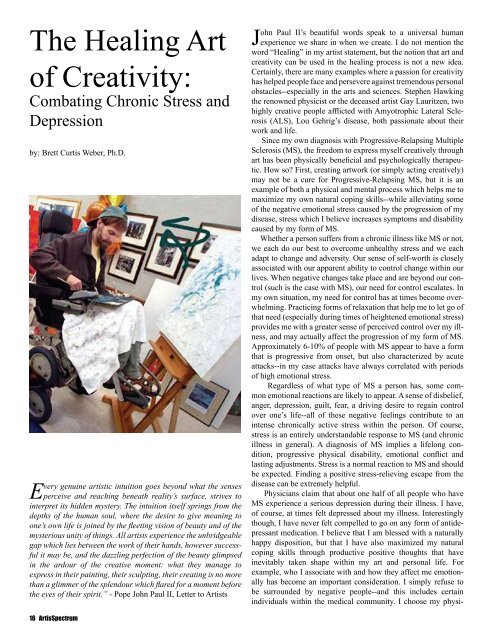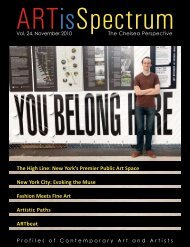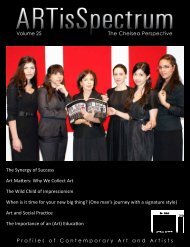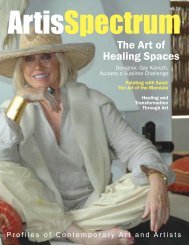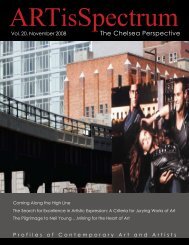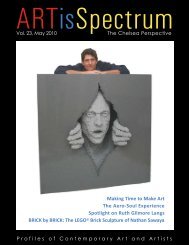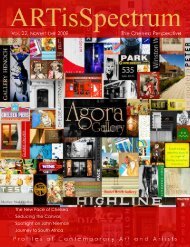<strong>The</strong> Healing Artof Creativity:Combating Chronic Stress andDepressionby: Brett Curtis Weber, Ph.D.Every genuine artistic intuition goes beyond what the sensesperceive and reaching beneath reality’s surface, strives tointerpret its hidden mystery. <strong>The</strong> intuition itself springs from thedepths of the human soul, where the desire to give meaning toone’s own life is joined by the fleeting vision of beauty and of themysterious unity of things. All artists experience the unbridgeablegap which lies between the work of their hands, however successfulit may be, and the dazzling perfection of the beauty glimpsedin the ardour of the creative moment: what they manage toexpress in their painting, their sculpting, their creating is no morethan a glimmer of the splendour which flared for a moment beforethe eyes of their spirit.” - Pope John Paul II, Letter to ArtistsJohn Paul II’s beautiful words speak to a universal humanexperience we share in when we create. I do not mention theword “Healing” in my artist statement, but the notion that art andcreativity can be used in the healing process is not a new idea.Certainly, there are many examples where a passion for creativityhas helped people face and persevere against tremendous personalobstacles--especially in the arts and sciences. Stephen Hawkingthe renowned physicist or the deceased artist Gay Lauritzen, twohighly creative people afflicted with Amyotrophic Lateral Sclerosis(ALS), Lou Gehrig’s disease, both passionate about theirwork and life.Since my own diagnosis with Progressive-Relapsing MultipleSclerosis (MS), the freedom to express myself creatively throughart has been physically beneficial and psychologically therapeutic.How so? First, creating artwork (or simply acting creatively)may not be a cure for Progressive-Relapsing MS, but it is anexample of both a physical and mental process which helps me tomaximize my own natural coping skills--while alleviating someof the negative emotional stress caused by the progression of mydisease, stress which I believe increases symptoms and disabilitycaused by my form of MS.Whether a person suffers from a chronic illness like MS or not,we each do our best to overcome unhealthy stress and we eachadapt to change and adversity. Our sense of self-worth is closelyassociated with our apparent ability to control change within ourlives. When negative changes take place and are beyond our control(such is the case with MS), our need for control escalates. Inmy own situation, my need for control has at times become overwhelming.Practicing forms of relaxation that help me to let go ofthat need (especially during times of heightened emotional stress)provides me with a greater sense of perceived control over my illness,and may actually affect the progression of my form of MS.Approximately 6-10% of people with MS appear to have a formthat is progressive from onset, but also characterized by acuteattacks--in my case attacks have always correlated with periodsof high emotional stress.Regardless of what type of MS a person has, some commonemotional reactions are likely to appear. A sense of disbelief,anger, depression, guilt, fear, a driving desire to regain controlover one’s life--all of these negative feelings contribute to anintense chronically active stress within the person. Of course,stress is an entirely understandable response to MS (and chronicillness in general). A diagnosis of MS implies a lifelong condition,progressive physical disability, emotional conflict andlasting adjustments. Stress is a normal reaction to MS and shouldbe expected. Finding a positive stress-relieving escape from thedisease can be extremely helpful.Physicians claim that about one half of all people who haveMS experience a serious depression during their illness. I have,of course, at times felt depressed about my illness. Interestinglythough, I have never felt compelled to go on any form of antidepressantmedication. I believe that I am blessed with a naturallyhappy disposition, but that I have also maximized my naturalcoping skills through productive positive thoughts that haveinevitably taken shape within my art and personal life. Forexample, who I associate with and how they affect me emotionallyhas become an important consideration. I simply refuse tobe surrounded by negative people--and this includes certainindividuals within the medical community. I choose my physi-16 ArtisSpectrum
cians and my friends very carefully. <strong>The</strong>y have a powerful impacton the way we feel about ourselves--rousing courage and hope,or fear and depression.<strong>The</strong>re are a wide range of physical symptoms that may comeand go over time with MS. <strong>The</strong> disease causes damage withinthe central nervous system along nerve pathways affecting movement,speech, vision, hearing, and bladder & bowel control. Whatis not commonly recognized is that the disease can also directlyinterfere with a person’s ability to think clearly. Damage withinthe brain can create changes that affect problem-solving, attention,learning and memory. I believe that just as physical therapycan help people with MS maintain as much physical abilityas possible, mental therapies that encourage problem-solving,attention, learning and memory skills can help people with MSmaintain as much cognitive ability as possible. Strategies suchas art therapy and other positive challenging creative outlets mayhelp improve or maintain partially impaired cognitive pathwayswithin the brain, and may enhance an individual’s self-worth andnatural coping skills against depression and perhaps fatigue.that scientists must ponder questions from opposing points ofview so that eventually we find the correct answers to difficultproblems. Below, the inverted image reveals itself to me as a solareclipse and so I named the painting “Moon.”Moon (original painting and digital image)“On the day of the new moon, in the month of Hiyar, the Sun was put to shame, and wentdown in the daytime, with the Venus star in attendance.”- Record of an eclipse on Sun 3 May 1375 B.C.discovered in Mesopotamia.Memory(derived from painting and sister image)“<strong>The</strong>re is no human being who does notcarry a treasure in his soul, a momentof insight, a memory of life, a dream ofexcellence, a call to worship.”- Abraham Heschel (1907 - 1972)My paintings are abstractions. I do not intend to paintrepresentational images. From time to time they may appearto be something recognizable, and then I may give them theobvious or not so obvious name, but I never intend to paintanything representational. All the same, because I do name mypaintings (other artists often leave their abstract art untitled),I do believe that I eventually come to recognize after somereflection what my paintings represent. <strong>The</strong> entire process ofcreating and then naming my paintings provides me with a verysatisfying physical, emotional, intellectual and spiritual release.What’s more, because I approach my artwork with no expectationsof good or bad, right or wrong, correct or incorrect, muchas a young child first approaches art, I experience very little ofthe stress and anxiety that is often associated with the creativeprocess. What will people think of my creative work? A questionthat once caused me anxiety (example my Ph.D defense),has become much less important in view of my illness. I createartwork for my own enjoyment now, and to my own personalsatisfaction.Why do I invert the color of my paintings in my digital art?Well, the inverted color spectrum is beautiful, revealing in that ituncovers hidden elements within the paintings, and also emotionallysoothing especially when placed along side the original sisterimage. <strong>The</strong> inverted colors also serve to remind me symbolicallyViewed together the original painting and sister image can beseen as equivalent or contradictory, an analogy to the arts andsciences--and a metaphor that conscious and unconsciouselements within us affect health simultaneously in both positiveand negative directions.You may have noticed that I only work on square canvases.This is because while I am painting I do not consider the finalorientation of the work. I paint freely and often turn and spin thecanvas in different directions and then again when I am interpretingthe final abstraction. Only after I have given the painting (anddigital art) a name do they receive their final correct orientation. Icall the process “Wakeful Dreaming” because much like the earlyFreudian and Jungian psychologists who first attempted to understandtheir patients’ dreams using various techniques, I attempt tounderstand my paintings (and digital art) by giving them each aspecific name which usually comes to me upon reading a famous(or not so famous) quotation, or idea. In this way the processof freely creating abstract imagery that I reflect on and finallyname embodies an ongoing conversation that I have with myself.In practice, a dialogue between my unconscious, dreamlike,symbolic mind (characterized by my artwork) and my conscious,rational, literate mind (characterized by the quotations I choose).Together, the quotations and artwork speak to me as both a criticand a friend.<strong>The</strong> last step to my creative process is to break my artworksymbolically. I do this by combining the original painting and sisterimage. I was diagnosed with MS the week before finishing myPh.D. in neuroscience. I remember how I felt that week--shock, asense of disbelief, as though a brick had just shattered my newlycompleted stained-glass window. Unlike the original paintingsand sister images, my broken art stood alone without words whenfirst exhibited. Since that time, however, something internal haspushed me to add a few words, a final thought. What would myBroken Art say if it could speak? If I could just continue the twothoughts expressed within each painting and sister image, whatfinal thought might appear? continued on pg. 3617 ArtisSpectrum


